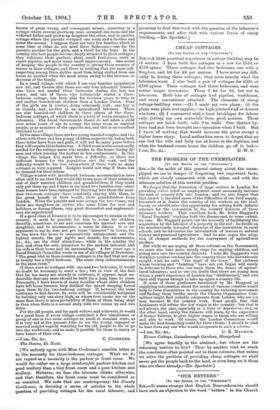THE PROBLEM OF THE UNEMPLOYED.
[To THR EDITOR Or Till " SPECrarou."]
Snt,—In the midst of this general outcry about the unem- ployed, we are in danger of forgetting two important facts, which are closely connected with each other, and with the ultimate solution of this terrible problem.
We forget that the formation of large centres in London, for providing either relief or employment, must necessarily increase the rush of country folk into London ; and we also forget that that inrush is the chief cause of the difficulties of our food supply, inasmuch as it drains the country of the workers on the land. Surely we should seize this opportunity for setting forth definite schemes for the restoration to the country districts of these necessary workers. That excellent book, Mr. Rider Haggard's "Rural England," explains both the disease and, to some extent, its cure. Mr. Haggard points out the necessity of facilitating the acquisition by the labourer of a property in the soil; he dwells on the mischievously townified character of the instruction in rural schools, and he advocates the introduction of lessons in natural history and practical agriculture. And he also urges the adop- tion of cheaper methods for the conveyance of agricultural produce. But while we are urging all these reforms on the Government, we must also take more speedy steps for sending children and young men into the country districts. I note Mr. Haggard's wise warnings against sending into the country those who have already caught what he calls "the taint of the town." But children whose training and " tainting " have not yet begun will surely be welcome to those who can teach them the duties of agricul- tural labourers; and no one can doubt that there are young men whom a year's experience of London has "disillusioned," and who have still vigour enough to take up again a country life.
If some of those gentlemen mentioned by Mr. Haggard as supplying information about the needs of various counties would help to form Committees in the country for receiving newcomers and finding them berths, surely the Charity Organisation Com- mittees might find suitable emigrants from London who are (or may become) fit for country work. Some people fear that Londoners will refuse the low wages in the country ; but that is not always the case, especially in a time of depression ; and, on the other hand, surely the farmers will learn, by the experience of former failures, to give higher wages to those who are willing and able to work. Of course, the London Committees would make the best terms they could for their clients. I should be glad to hear from any one who would co-operate in such a scheme.
Eirene Cottage, Gainsbcrrough Gardens, Hampstead.
[We agree heartily in the abstract ; but where are the returning natives to live ? Thus by another road we reach the conclusion often pointed out in these columns, that unless we solve the problem of providing cheap cottages we shall never get the people back to the land, or even keep on it those
who are there already.—ED. Spectator.]










































 Previous page
Previous page